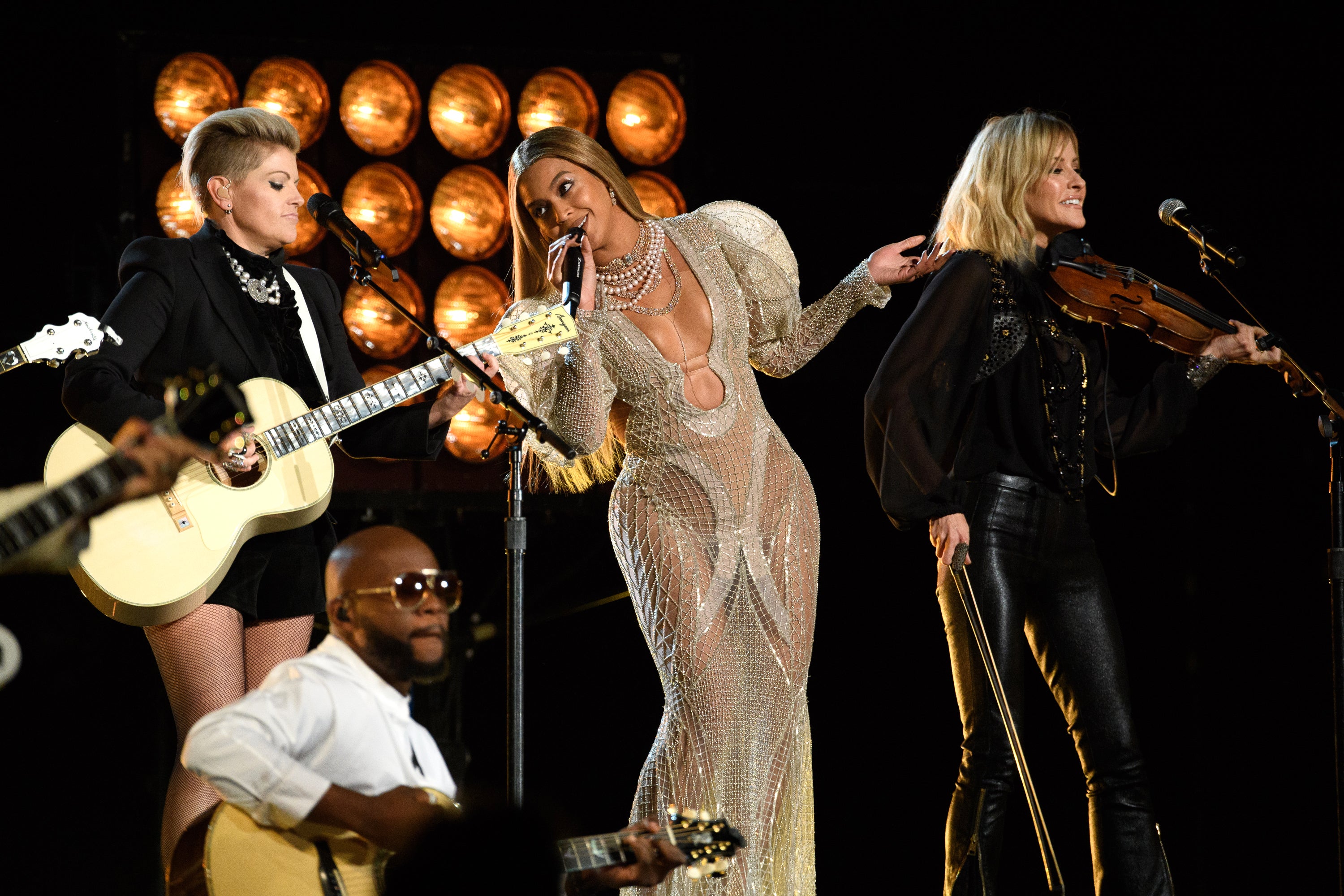
Beyoncé’s surprise performance with The Dixie Chicks at the 2016 Country Music Awards had everyone buzzing.
Announced only a few short hours before the show aired live, the Bey Hive geared up and spread the word, encouraging Black audiences to do something they don’t usually do—watch the Country Music Awards. The women performed Beyoncé’s “Daddy Lessons,” the poignant country song from her latest project, Lemonade, and Beyoncé reminded America that not only do Black Girls Rock—we have some country in us too!
Shortly after their performance, it appeared as though the social media accounts associated with the awards show removed images and references to the performance and some sources speculated that it was because of the overwhelming racist responses to Beyoncé being asked to perform at the show. Unfortunately, some people only think of country music in terms of its White performers and they consider a Black woman performing country music as some kind of theft of their art.
The official website posted the images of the performance and listed the women as performers, so the erasure wasn’t complete; it just seemed really suspicious that video clips and images were hard to find on the CMA’s social media channels.
Well, the truth is that Black women have been performing country music and rock ‘n’ roll since the inception of both genres, but, as is often the case, have found themselves routinely erased from the annals of country and rock music folklore.
Sister Rosetta Tharpe has been more widely embraced as the “Godmother of Rock ‘n’ Roll” in recent years, though many cite “Rocket 88” by Jackie Brenston and His Delta Cats as the first likely recorded rock ‘n’ roll song. Everyone from Elvis Presley to Chuck Berry were directly influenced by her brazen flair, but historical sexism and racism have prevented hers from becoming a household name. In 1997, Tracy Chapman was the first Black woman to win a Grammy award for Best Rock Song, introducing a new generation to our legacy as innovative queens of rock ‘n’ roll.
Subscribe to our daily newsletter for the latest in hair, beauty, style and celebrity news.
While we’re often known for belting out rhythmic melodies and singing our lovelorn blues, Black women have consistently churned out songs that span all genres of music, including country. A number of our favorite artists like Etta James, The Supremes, and Tina Turner have all recorded country music and the tradition continues today, with singer-songwriters like Tennessee native Valerie June and Texas’ Mickey Guyton.
One reason we may not be as familiar with the legends’ country songs is that when they were recorded and released, the songs weren’t pushed into country markets, likely due in large part to racist intolerance and volatility of the 1960s.
In 1969, however, South Carolina’s Linda Martell made history when she became the first Black woman to perform at the Grand Ole Opry after releasing her Top 25 hit country song, “Color Him Father.” She opened the door for more popular artists like Tina Turner to record the country music they grew up listening to and loving as their own. In 1973, Turner released “Nutbush City Limits,” the rock ode to her hometown in Tennessee and last song produced with her ex-husband, Ike Turner. Turner’s debut solo album, 1975’s Tina Turns the Country On! featured songs by Dolly Parton and Kris Kristofferson and was nominated for a Grammy Award for Best R&B Vocal Performance (Female).
As with Etta James and The Supremes before her, categorization as an R&B artist prevented Turner from being included as a notable country singer of the time despite the international fame and success she has achieved thus far. It wasn’t until 1975 when The Pointer Sisters won the Grammy for Best Country Performance (Duo or Group) with Vocal, did Black women receive mainstream recognition for their contribution to the genre. “Fairytale,” a song about love’s empty promises and losses, was unlike anything the Sisters had previously recorded and was later covered by none other than Elvis Presley in 1975.
Mickey Guyton didn’t make the cut for American Idol, but she signed to Capital Nashville records and released her debut album Unbreakable in 2014. In 2015, she debuted her single “Better Than You Left Me” at the Grand Ole Opry, making her only the fourth Black country singer to perform there and the second woman after Martell. Valerie June, who has been compared to Dolly Parton and Billie Holiday, stayed true to her small town Tennessee roots on her debut album, Pushing Against the Stone. Her vocals are equally sweet and haunting, and her sound hearkens back to the traditional Appalachian folk music of yesteryear. And Brittany Howard, lead singer of Alabama Shakes, invokes Tharpe in her vocal styling and delivery as she blends traditional rock ‘n’ roll and modern country music on the group’s critically-acclaimed, Grammy Award-winning albums.
Black women sing. We sing the blues, we rock out with the best of them, and we croon country tunes that both melt and soothe battered and broken hearts.
As pioneers of rock ‘n’ roll, jazz, Rhythm and Blues, and gospel, it’s important to note that we have a presence everywhere, despite continuous efforts to render us invisible. Beyoncé’s popularity introduced fans of all ages to our country tradition and it remains unfortunate that some Americans refuse to accept us as instrumental figures in American popular culture when it is clear we set trends, cross boundaries, and break records like no other group.
Perhaps now we will see record labels encouraging more artists to embrace their down-home roots and explore opportunities to represent Black country singers.